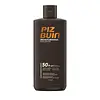What's inside
What's inside
 Key Ingredients
Key Ingredients

 Benefits
Benefits

 Concerns
Concerns

 Ingredients Side-by-side
Ingredients Side-by-side

Octocrylene
UV AbsorberC12-15 Alkyl Benzoate
AntimicrobialEthylhexyl Salicylate
UV AbsorberButyl Methoxydibenzoylmethane
UV AbsorberBis-Ethylhexyloxyphenol Methoxyphenyl Triazine
Skin ConditioningHexylene Glycol
EmulsifyingIsopropyl Isostearate
EmollientTriacontanyl Pvp
HumectantGlyceryl Stearate
EmollientPEG-100 Stearate
Caprylyl Glycol
EmollientTribehenin
EmollientAluminum Starch Octenylsuccinate
AbsorbentPotassium Cetyl Phosphate
EmulsifyingAcrylates Copolymer
Disodium EDTA
Sodium Hydroxide
BufferingPentaerythrityl Tetra-Di-T-Butyl Hydroxyhydrocinnamate
AntioxidantTocopheryl Acetate
AntioxidantPhenoxyethanol
PreservativePotassium Sorbate
PreservativeParfum
MaskingOctocrylene, C12-15 Alkyl Benzoate, Ethylhexyl Salicylate, Butyl Methoxydibenzoylmethane, Bis-Ethylhexyloxyphenol Methoxyphenyl Triazine, Hexylene Glycol, Isopropyl Isostearate, Triacontanyl Pvp, Glyceryl Stearate, PEG-100 Stearate, Caprylyl Glycol, Tribehenin, Aluminum Starch Octenylsuccinate, Potassium Cetyl Phosphate, Acrylates Copolymer, Disodium EDTA, Sodium Hydroxide, Pentaerythrityl Tetra-Di-T-Butyl Hydroxyhydrocinnamate, Tocopheryl Acetate, Phenoxyethanol, Potassium Sorbate, Parfum
Water
Skin ConditioningAlcohol Denat.
AntimicrobialEthylhexyl Methoxycinnamate
UV AbsorberPropylene Glycol
HumectantDimethicone
EmollientCaprylic/Capric Triglyceride
MaskingEthylhexyl Triazone
UV AbsorberDiethylamino Hydroxybenzoyl Hexyl Benzoate
UV FilterAluminum Starch Octenylsuccinate
AbsorbentSodium Hyaluronate
HumectantPinus Taeda Bark Extract
TonicPyrus Cydonia Fruit Extract
Skin ConditioningTocopheryl Acetate
AntioxidantAcrylates/C10-30 Alkyl Acrylate Crosspolymer
Emulsion StabilisingCeteth-10
EmulsifyingSodium Hydroxide
BufferingMethylparaben
PreservativeWater, Alcohol Denat., Ethylhexyl Methoxycinnamate, Propylene Glycol, Dimethicone, Caprylic/Capric Triglyceride, Ethylhexyl Triazone, Diethylamino Hydroxybenzoyl Hexyl Benzoate, Aluminum Starch Octenylsuccinate, Sodium Hyaluronate, Pinus Taeda Bark Extract, Pyrus Cydonia Fruit Extract, Tocopheryl Acetate, Acrylates/C10-30 Alkyl Acrylate Crosspolymer, Ceteth-10, Sodium Hydroxide, Methylparaben
Ingredients Explained
These ingredients are found in both products.
Ingredients higher up in an ingredient list are typically present in a larger amount.
Aluminum Starch Octenylsuccinate is a synthetic powder used as an absorbent, thickener, and anti-caking agent.
As an absorbent, it is great at mattifying skin by soaking up the oil. This is why you'll find it in a range of products from makeup to moisturizers.
This ingredient is considered a modified starch. Starch can also be found naturally in plants.
One study from 1991 found that 5% of this ingredient enhanced titanium dioxide SPF by as much as 40%. The study found 1% titanium dioxide had a 5.6 SPF and adding 5% of aluminum starch octenylsuccinate boosted it to an SPF of 8.1
Although “aluminum” in an ingredient name can raise red flags for some consumers, the form and usage context matter significantly. For typical topical applications, there is no substantial evidence of health risks - such as cancer, neurotoxicity, or systemic “aluminum overload.”
Learn more about Aluminum Starch OctenylsuccinateSodium Hydroxide is also known as lye or caustic soda. It is used to adjust the pH of products; many ingredients require a specific pH to be effective.
In small amounts, sodium hydroxide is considered safe to use. However, large amounts may cause chemical burns due to its high alkaline.
Your skin has a natural pH and acid mantle. This acid mantle helps prevent harmful bacteria from breaking through. The acid mantle also helps keep your skin hydrated.
"Alkaline" refers to a high pH level. A low pH level would be considered acidic.
Learn more about Sodium HydroxideTocopheryl Acetate is AKA Vitamin E. It is an antioxidant and protects your skin from free radicals. Free radicals damage the skin by breaking down collagen.
One study found using Tocopheryl Acetate with Vitamin C decreased the number of sunburned cells.
Tocopheryl Acetate is commonly found in both skincare and dietary supplements.
Learn more about Tocopheryl Acetate